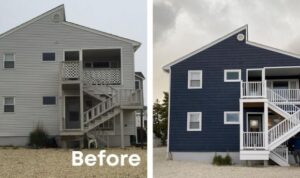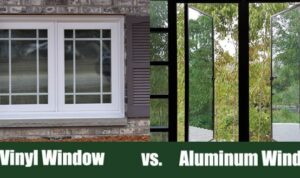When it comes to choosing between vinyl and aluminum windows, the decision can greatly impact your home's aesthetics, energy efficiency, and maintenance needs. Let's dive into the world of windows and explore the key differences between these two popular window materials.
Vinyl Windows
Vinyl windows are made from PVC (polyvinyl chloride) material, which is a type of plastic commonly used in construction. This material is known for its durability, energy efficiency, and low maintenance requirements.
Composition of Vinyl Windows
Vinyl windows are made by extruding PVC material into various shapes and sizes to form window frames and sashes. These frames are then reinforced with metal or other materials to provide strength and stability. The PVC material is resistant to moisture, rot, and insect damage, making it a popular choice for window construction.
Durability of Vinyl Windows
Vinyl windows are highly durable and can withstand harsh weather conditions without warping, cracking, or fading. They are also resistant to corrosion, rust, and rot, making them a long-lasting option for homeowners. Compared to aluminum windows, vinyl windows are less prone to dents and scratches, maintaining their appearance over time.
Maintenance Requirements for Vinyl Windows
One of the key advantages of vinyl windows is their low maintenance requirements. They do not need to be painted or stained, as the color is integrated into the material during manufacturing. Cleaning vinyl windows only requires mild soap and water, making them easy to maintain and keep looking new for years to come.
Aluminum Windows
Aluminum windows are known for their modern and sleek appearance, making them a popular choice for contemporary architectural designs. They are lightweight, durable, and resistant to corrosion, making them suitable for various weather conditions.
Energy Efficiency
- Aluminum windows are not as energy-efficient as vinyl windows due to their poor insulation properties.
- Additional measures such as thermal breaks or double glazing can be added to improve the energy efficiency of aluminum windows.
- Proper installation and sealing are crucial to minimize heat loss and air leakage.
Cost-Effectiveness in the Long Term
- Although aluminum windows may have a higher upfront cost compared to vinyl windows, they are durable and require minimal maintenance.
- With proper care, aluminum windows can last for decades, making them a cost-effective choice in the long run.
- Regular cleaning and lubrication of moving parts can help prolong the lifespan of aluminum windows.
Aesthetics

Vinyl and aluminum windows both offer unique aesthetic qualities that can enhance the overall look of a home or building. Let's explore the differences in aesthetic appeal, color options, and how the design of each window type can complement various architectural styles.
Aesthetic Appeal
When it comes to aesthetic appeal, vinyl windows are known for their versatility and ability to mimic the look of traditional wood windows. They come in a variety of styles, such as double-hung, casement, and picture windows, allowing for customization to suit different preferences.
On the other hand, aluminum windows have a more modern and sleek appearance, with slim frames that provide a contemporary look. The choice between vinyl and aluminum windows often comes down to personal taste and the architectural style of the building.
Color Options
Vinyl windows offer a wide range of color options to choose from, including traditional white, beige, and brown, as well as more vibrant colors like red or blue. The colors are integrated into the material during manufacturing, making them fade-resistant and low-maintenance.
In contrast, aluminum windows can be painted in virtually any color, giving homeowners the flexibility to match or contrast with the exterior of their home. This versatility in color options allows for greater customization and personalization.
Complementing Architectural Styles
The design of vinyl windows lends itself well to traditional and classic architectural styles, such as Colonial, Victorian, or Craftsman homes. The ability to emulate the look of wood without the maintenance makes vinyl windows a popular choice for those seeking a timeless aesthetic
On the other hand, aluminum windows are often used in more contemporary and modern architectural designs, where the sleek lines and minimalist frames complement the overall look. The clean and streamlined appearance of aluminum windows can enhance the visual appeal of buildings with a more modern aesthetic.
Installation and Customization

When it comes to installing and customizing vinyl and aluminum windows, there are several key differences to consider. Let's delve into the specifics of each material to help you make an informed decision for your next window replacement project.
Installation Process
Installing vinyl windows typically involves the following steps:
- Measure the window opening accurately to ensure a perfect fit.
- Remove the old window and prep the opening by cleaning and leveling it.
- Secure the vinyl window frame in place and insulate around the edges to prevent air leaks.
- Finish the installation by adding trim around the window for a polished look.
On the other hand, aluminum windows installation process includes:
- Measure and remove the old window, similar to vinyl windows.
- Secure the aluminum frame in place, which may require additional support due to the material's weight.
- Seal the window with proper insulation to prevent drafts and water leaks.
- Add finishing touches like caulking and trim for a complete installation.
Customization Options
When it comes to customization, vinyl windows offer a wide range of colors and finishes to match your home's aesthetic. They can also be easily painted to achieve a specific look if desired.
Aluminum windows, on the other hand, are known for their sleek and modern appearance. While they may not offer as many color options as vinyl, they can be powder-coated to achieve a custom finish.
Challenges and Benefits
One of the main challenges of installing vinyl windows is that they can expand and contract with temperature changes, potentially affecting their fit over time. However, they are generally easier to install due to their lighter weight.
Aluminum windows, while more durable and weather-resistant, can be trickier to install due to their heavier frame. They also conduct heat and cold more easily than vinyl, which can impact energy efficiency.
Last Point
In conclusion, the choice between vinyl and aluminum windows ultimately depends on your specific needs and preferences. Whether you prioritize durability, energy efficiency, or design aesthetics, understanding the differences between these window types is crucial in making an informed decision for your home.
FAQs
Which is more durable, vinyl or aluminum windows?
Vinyl windows are known for their durability and resistance to the elements, making them a long-lasting option for homeowners.
Are aluminum windows more energy efficient than vinyl windows?
Aluminum windows are typically less energy efficient than vinyl windows due to their conductive properties, which can lead to heat loss.
Can vinyl and aluminum windows be customized to fit different architectural styles?
Both vinyl and aluminum windows offer customization options to complement various architectural styles, allowing homeowners to personalize their window designs.






